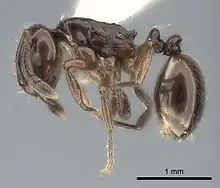Monomorium bidentatum
Monomorium bidentatum is a species of ant in the subfamily Myrmicinae. It is endemic to two South American countries, Chile and Argentina.
| Monomorium bidentatum | |
|---|---|
 | |
| Monomorium bidentatum worker | |
| Scientific classification | |
| Domain: | Eukaryota |
| Kingdom: | Animalia |
| Phylum: | Arthropoda |
| Class: | Insecta |
| Order: | Hymenoptera |
| Family: | Formicidae |
| Subfamily: | Myrmicinae |
| Genus: | Monomorium |
| Species: | M. bidentatum |
| Binomial name | |
| Monomorium bidentatum Mayr, 1887 | |
| Synonyms | |
| |
Description
Workers are around 3.5 millimetres (0.14 in) long. The general color is dark brown, with the mandibles, antennae and legs slightly lighter. Females are almost 4.5 mm (0.18 in) long, but otherwise very similar to workers.[2]
Distribution
M. bidentatum is found in Chile and Argentina.[3] It was first described from Valdivia, Chile.[2]
Taxonomy
The genus Antichthonidris contained only two species, A. bidentata and A. denticulata.[4] Both species were originally described by Gustav Mayr under genus Monomorium.[2] However, Antichthonidris was synonymized with Monomorium in 2001, so that this genus is no longer valid, and the two species are again known under their original name.
References
- Social Insects Specialist Group (1996). "Antichthonidris bidentatus". IUCN Red List of Threatened Species. 1996: e.T1675A6358216. doi:10.2305/IUCN.UK.1996.RLTS.T1675A6358216.en.
- Gustav L. Mayr (1887). "Südamerikanische Formiciden" [South American Formicidae] (PDF). Verhandlungen der kaiserlich-königlichen zoologisch-botanischen Gesellschaft in Wien. 37: 511–632.
- F. Fernández (2007). R. R. Snelling; B. L. Fisher; P. S. Ward (eds.). "Two new South American species of Monomorium Mayr with taxonomic notes on the genus" (PDF). Advances in Ant Systematics (Hymenoptera: Formicidae): Homage to E. O. Wilson – 50 Years of Contributions; Memoirs of the American Entomological Institute. 80: 128–145.
- "Antichthonidris". Integrated Taxonomic Information System.
